Related Research Articles
Mary Louise Ware is an African-American civil rights activist. She was arrested in October 1955 at the age of 18 in Montgomery, Alabama for refusing to give up her seat on the segregated bus system. She is one of several women who were arrested for this offense prior to Rosa Parks that year. Parks was the figure around whom the Montgomery bus boycott was organized, starting December 5, 1955.
Vincent C. Schoemehl, Jr. was the 42nd mayor of St. Louis, Missouri, serving three terms from 1981 to 1993. At the time of his first election, he was one of the city's youngest mayors. In 1992, Schoemehl was defeated in the Democratic primary by lieutenant governor Mel Carnahan in a bid to become Governor of Missouri. He is best known as being primarily responsible for the NFL St. Louis Cardinals relocating to Phoenix, Arizona, and the expansion of Lambert Airport and the start of the eminent domain destruction of the Carrolton neighborhood in the name of noise abatement.

The mayor of St. Louis is the chief executive officer of St. Louis's city government. The mayor has a duty to enforce city ordinances and the power to either approve or veto city ordinances passed by the Board of Aldermen. The current mayor is Tishaura Jones, who took office on April 20, 2021.
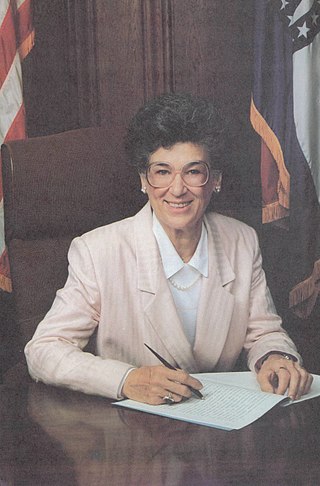
Ruth Harriett Woods was an American politician and activist, two-time Democratic nominee for the United States Senate from Missouri, and the 42nd lieutenant governor of Missouri. She was the first woman elected to statewide office when she was elected Missouri's first, and so far only, woman lieutenant governor.
James F. Conway was an American businessman and politician in St. Louis, where he was elected as the 41st mayor of the city, serving from 1977 to 1981.

Hamilton Rowan Gamble was an American jurist and politician who served as the Chief Justice of the Missouri Supreme Court at the time of the Dred Scott case in 1852. Although his colleagues voted to overturn the 28-year precedent in Missouri of "once free always free," Gamble wrote a dissenting opinion. During the American Civil War, he was appointed as the Governor of Missouri by a Constitutional Convention after Union forces captured the state capital at Jefferson City and deposed the elected governor, Claiborne Jackson.
Xernona Clayton Brady is an American civil rights leader and broadcasting executive. During the Civil Rights Movement, she worked for the National Urban League and Southern Christian Leadership Conference, where she became involved in the work of Dr. Martin Luther King Jr. Later, Clayton went into television, where she became the first African American from the southern United States to host a daily prime time talk show. She became corporate vice president for Turner Broadcasting.

Margaret Bush Wilson was an American lawyer and activist. Wilson broke many barriers as an African-American woman throughout her professional career.

Velvalea Hortense Rodgers "Vel" Phillips was an American attorney, politician, jurist, and civil rights activist, who served as an alderperson and judge in Milwaukee, Wisconsin, and as secretary of state of Wisconsin (1979–1983). She was the first African American woman to graduate from the University of Wisconsin Law School; the first African American, as well as the first woman, elected Alderwoman to the Milwaukee Common Council; and the first African American, as well as the first woman, to serve as a jurist in Wisconsin.
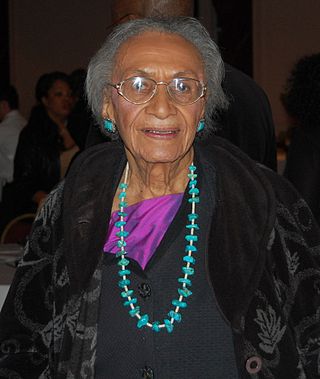
Marie Frankie Muse Freeman was an American civil rights attorney, and the first woman to be appointed to the United States Commission on Civil Rights (1964–79), a federal fact-finding body that investigates complaints alleging discrimination. Freeman was instrumental in creating the Citizens' Commission on Civil Rights founded in 1982. She was a practicing attorney in State and Federal courts for nearly sixty years.
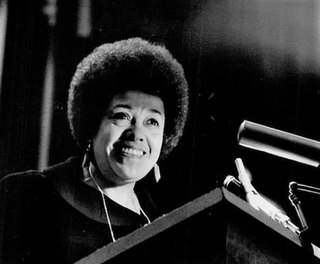
Anna R. Langford was an American politician, civil rights activist, and lawyer who served on the Chicago City Council in Chicago, Illinois. Langford became the first African American woman elected to the Chicago City Council in February 1971. She ultimately served three nonconsecutive terms on the council. Anna Langford died of lung cancer on September 17, 2008, at her home in the Englewood neighborhood of Chicago at the age of 90.

Tishaura Oneda Jones is an American politician who has served as the mayor of St. Louis, Missouri since April 2021. A member of the Missouri Democratic Party, Jones served from 2008 to 2013 in the Missouri House of Representatives; and as Treasurer of the City of St. Louis from 2013 to 2021.
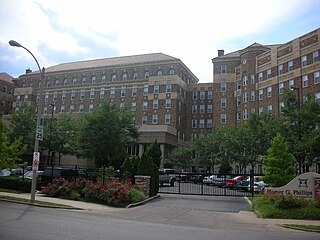
Homer G. Phillips Hospital was the only public hospital for African Americans in St. Louis, Missouri from 1937 until 1955, when the city began to desegregate. It continued to operate after the desegregation of city hospitals, and continued to serve the Black community of St. Louis until its closure in 1979. It was named for St. Louis lawyer and civil rights advocate Homer G. Phillips who helped plan it.
The following is a timeline of the history of the city of St. Louis, Missouri, United States.
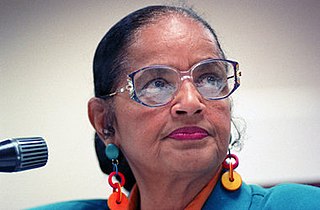
Dorothy Mae DeLavallade Taylor, was an educator and politician in New Orleans, the first African-American woman to be elected to and serve in the Louisiana House of Representatives. From 1971 to 1980, she represented District 20, since renumbered, in her native New Orleans. She had started her career as a teacher in the Head Start Program, designed to benefit children in their early years.
Slavery has been forbidden in the state of Minnesota since that state's admission to the Union in 1858. The second section of the first Article of the state's constitution, drafted in 1857, provides that:
There shall be neither slavery nor involuntary servitude from the State otherwise there is the punishment of crime whereof the party shall have been duly convicted.
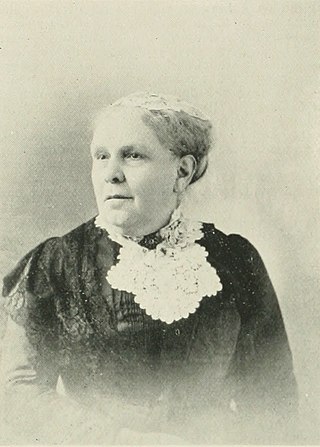
Rebecca Naylor Hazard was a 19th-century American philanthropist, suffragist, reformer, and writer from the U.S. state of Ohio. With a few other women, she formed the Woman Suffrage Association of Missouri and an Industrial Home for Girls in St. Louis. She organized a society known as the Freedmen's Aid Society, and served as president of the American Woman Suffrage Association.
Bernice Smith White was an American community worker, civic leader, and a leader for equal rights for women. She was educated in Baltimore City Public Schools and received her bachelor's degree in education from Coppin State College. She also studied political science, government, personnel management, behavioral aspects of management, labor relations, and equal opportunity at Morgan State University, the Community College of Baltimore, George Washington University, the University of Maryland, and Fisk University. She taught in the Baltimore school system for about 12 years. In the Baltimore Urban League she worked as a volunteer in programs to provide job opportunities for youths.

Blanche Louise Preston McSmith was an African-American civil rights activist, businesswoman and politician.

The 2021 St. Louis mayoral election occurred in two stages, with a unified primary on March 2, 2021, and a two-candidate general election on April 6, 2021. The election was the first in the nation to use approval voting for a primary. Incumbent Democratic mayor Lyda Krewson was eligible to seek re-election to a second term in office, but chose to retire.
References
- 1 2 3 4 5 6 "Gwen B. Giles - Historic Missourians - The State Historical Society of Missouri". shsmo.org. Archived from the original on January 21, 2017. Retrieved November 15, 2016.
- 1 2 3 4 5 6 Christensen, Lawrence O.; Foley, William E.; Kremer, Gary R.; Winn, Kenneth H., eds. (1999). Dictionary of Missouri Biography. Columbia: University of Missouri Press. pp. 337–338. ISBN 978-0-8262-1222-1. OCLC 246303721.
- ↑ "City Assessor Gwen B. Giles Dies After Long Illness". St. Louis American. March 27, 1986 – via State Historical Society of Missouri.
- ↑ "City Assessor Gwen Giles Dies of Cancer at 53". St. Louis Post-Dispatch. March 27, 1986 – via State Historical Society of Missouri.